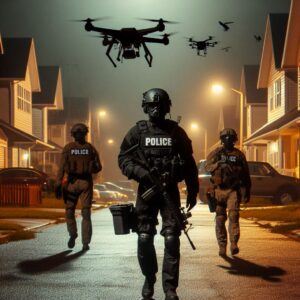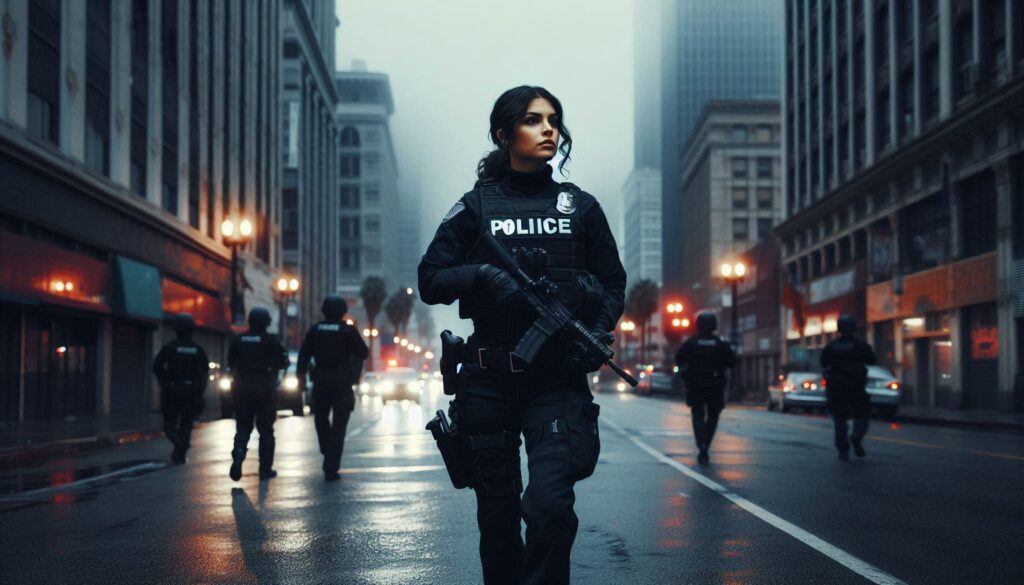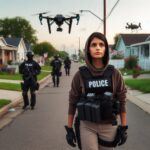
A police state is a term used to describe a government that maintains strict control over society, primarily through law enforcement and surveillance. This typically involves extensive monitoring, limited freedoms, and an overarching presence of the police or other security forces. The government’s power in such a state is often unchecked, leading to possible abuses and human rights violations.
Historically, police states have emerged in various forms. Some well-known examples include Nazi Germany under Adolf Hitler and the Soviet Union under Joseph Stalin. Both regimes used a combination of propaganda, surveillance, and brutal force to suppress opposition and control the populace. These states worked to eliminate political dissent, restrict freedom of speech, and create an atmosphere of fear.
Modern police states may not always be as overt or extreme as these historical examples, but the principles remain the same. You might find increased scrutiny and surveillance, with governments claiming the need to maintain order and national security. Certain regions in the world today show traits of this system, reflecting the ongoing relevance of the concept.
In a police state, law enforcement agencies play a pivotal role. They often operate with significant autonomy and may work outside the bounds of traditional legal frameworks. Routine activities like public demonstrations, political activism, and even daily communications may face heavy-handed policing.
Civil liberties take a substantial hit in a police state. Freedom of speech, the right to privacy, and freedom of assembly might all be curtailed. This impacts not just political activists but ordinary citizens who may find their day-to-day lives under scrutiny and subject to arbitrary enforcement actions. A police state may result in civil unrest and rioting because of the loss of freedoms. On the other hand, the Government may also become a police state because of overwhelming cases of violent protests. Also. just the right disaster event could easily send any Country into a police state. Beware and be ready for anything.
Causes Behind the Emergence of Police States

Understanding why police states occur can help us identify early warning signs and hopefully prevent such developments. Several factors often contribute to the rise of a police state, including socioeconomic crises, political upheaval, and scenarios where governments overreach their powers.
Natural and man-made disasters frequently provide fertile ground for the establishment of police states. In the chaos following massive earthquakes, wars, or pandemics, governments might justify taking strict control to maintain order. Such conditions make it easier for authorities to consolidate power, sometimes indefinitely.
Martial Law is another significant factor. During periods of severe unrest or emergency, governments may impose martial law, giving military authorities the power to enforce law and order. While this can temporarily restore stability, prolonged periods of martial law can erode democratic norms and civil rights, leading to a police state.
Government overreach is a critical issue that propels the formation of police states. When governments begin to exceed their legal authority, often under the guise of security, they chip away at the individual freedoms and institutional checks that safeguard against tyranny. Examples of overreach include surveillance programs, arbitrary detention, and censorship.
Ultimately, these causes create a climate of fear and dependency, making it difficult for individuals to oppose the government’s policies. People become wary of expressing dissent, which enables the state to tighten its grip further. Keeping an eye on these developments can equip societies with the knowledge needed to safeguard democracy and human rights.
Current Examples of Police States
Exploring modern examples of police states provides insights into how these regimes operate today. Several countries exemplify the characteristics of police states, impacting millions of lives and drawing international concern.
North Korea stands out as one of the most repressive police states. With its rigid control over information, tight surveillance, and suppression of dissent, it’s an example of a state where the government maintains absolute authority over its citizens’ lives.
China’s extensive surveillance infrastructure and strict control over the media and internet also mark it as a current example of a police state. The Chinese government’s approach to managing dissent in regions like Xinjiang and Hong Kong highlights their tight grip on civil liberties.
Russia features significant elements of a police state. Opposition politicians often face harassment, imprisonment, or worse. The media is heavily regulated, and public protests are met with strong police actions. This environment makes it difficult for independent voices to thrive.
Historical transitions further illustrate how nations can evolve into police states. Germany in the 1930s underwent a swift transformation from a democracy to a totalitarian regime under the Nazis. Similar patterns appear in other nations, showing how fragile freedoms can be eroded rapidly under certain conditions.
The impact on populations living in police states is profound. Civil liberties, such as freedom of speech and the press, are severely restricted. Daily life is marred by constant surveillance and the need for self-censorship. People sometimes disappear or are imprisoned without due process, creating an atmosphere of fear and compliance.
Global responses to police states vary. International organizations and individual countries often impose sanctions or make public condemnations. However, these measures have mixed success in altering the behavior of entrenched regimes. Understanding the dynamics of existing police states can help global communities develop more effective strategies to promote human rights and democratic values.
Evaluating the Risk of the US Becoming Police State
 In recent years, concerns have arisen about the United States potentially veering towards a police state. We saw how close the USA, and the world, was to police states everywhere during the Pandemic. It’s essential to critically assess the current socio-political climate, legislation, and public perception to understand the likelihood of such a shift in the future.
In recent years, concerns have arisen about the United States potentially veering towards a police state. We saw how close the USA, and the world, was to police states everywhere during the Pandemic. It’s essential to critically assess the current socio-political climate, legislation, and public perception to understand the likelihood of such a shift in the future.
The socio-political environment in the US has seen significant changes. Events like protests, riots, and political polarization have led to increased law enforcement presence and government measures to maintain order. The fear is that these actions could evolve into more permanent, restrictive controls.
Legislative changes are another area worth examining. Laws granting extensive surveillance powers and detention capabilities may be intended for national security (or so they say), but they sometimes encroach on civil liberties. Examples include provisions of the Patriot Act or various state-level laws aimed at curbing protests. While these laws aim to protect, their misuse could lead to abuses of power reminiscent of police state tactics.
Public perception of law enforcement also plays a crucial role. Trust in police and governmental institutions has fluctuated, especially concerning issues of racial injustice and police brutality. Widespread use of surveillance technology, like facial recognition and drones, has heightened concerns about privacy.
Experts in political science and law offer mixed opinions on whether the US is heading towards a police state. Some argue that checks and balances, including a robust judicial system and vibrant civil society, act as strong buffers against such a trend. Others caution that incremental changes, if left unchecked, could slowly erode essential freedoms. (Edit 9/28/24) Of course, that is all superficial narrative. We can never be sure what is going on behind the scenes. Right now, we are under direct threat from new UN-governed tyranny due to their turbo-charged efforts to fulfil Agenda 2030 and their Sustainable Development Goals, which they have wrapped up in sugar-coated candy for the world to eat out of their hands. The vast majority of Countries in the world (including the USA) already signed off on it. They signed away the sovereignty of our Nations behind our backs.
Drawing parallels with historical precedents can be illuminating. While the US (where I am from) enjoys a stable democratic framework, vigilance remains necessary. Historical examples show how quickly freedoms can disappear under certain conditions. By staying informed, citizens can help safeguard their rights and, at least temporarily, prevent any drift toward authoritarianism. But be aware and ready for anything. Within the next 5 years, we may be looking at a serious loss of freedoms (more than we already have), whether that includes a Police State, Martial Law, or otherwise.
__________________________________________________________________________________________________
* I may earn a commission if you click on certain links on this website
